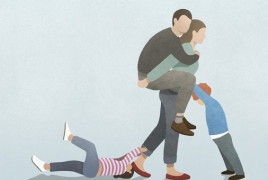
Invisible labor is a benign way of describing the never-ending, sometimes soul-crushing to-do list that women manage in order to keep their children thriving and households running smoothly.
A new study, published in the journal Sex Roles, offers original data to illustrate the widespread phenomenon of invisible labor — and its depressing impact on women's emotional and psychological well-being, Mashable says.
"Do [mothers] disproportionately feel like they're running their ship on their own?" said Suniya S. Luthar, co-author of the study and foundation professor of psychology at Arizona State University. "Just putting a number to that alone is a service to womankind."
Based on Luthar's survey of 393 American married or partnered mothers, many of whom were upper middle-class, the answer to her question is a resounding yes.
Nearly 90 percent of the participants said they bore sole responsibility for organizing their family's schedules. Seventy percent said they were "captain" of their ship and routinely completed and assigned household tasks. That includes the everyday drudgery of getting grab bags for parties, finding someone's socks, or coordinating rides to and from practices. Or as Luthar puts it: "All that nonsense that keeps churning around in our heads all the time."
While being solely in charge of household routines and tasks was associated with "a certain level of misery," those responsibilities didn't seem to influence psychological well-being. Yet Luther says the lack of variability in women's responses to these questions made it difficult to evaluate those results next to a comparison group and find statistically significant links between high responsibility for routines and greater increased distress for moms.
What Luthar and her co-author did find, however, is that when women say they're solely charged with handling their child's well-being, including being attentive to their emotions and relationships, it can lead to lower satisfaction with their partner and their life, as well as feelings of emptiness.
Two-thirds of respondents said they were responsible for being "vigilant" of their child's emotions, and 78 percent said they were the parent who knows their child's teachers and school administrators.

